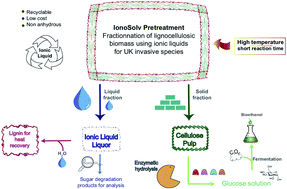Rhododendron and Japanese Knotweed: invasive species as innovative crops for second generation biofuels for the ionoSolv process†
Abstract
We investigated the potential of two terrestrial biomass invasive species in the United-Kingdom as lignocellulosic biofuel feedstocks: Japanese Knotweed (Fallopia japonica) and Rhododendron (Rhododendron ponticum). We demonstrate that a pretreatment technique using a low-cost protic ionic liquid, the ionoSolv process, can be used for such types of plant species considered as waste, to allow their integration into a biorefinery. N,N,N-Dimethylbutylammonium hydrogen sulfate ([DMBA][HSO4]) was able to fractionate the biomass into a cellulose-rich pulp and a lignin stream at high temperatures (150–170 °C) and short reaction times (15–60 minutes). More than 70–80% of the subsequent cellulose was hydrolysed into fermentable sugars, which were fermented into the renewable energy vector bioethanol.



 Please wait while we load your content...
Please wait while we load your content...